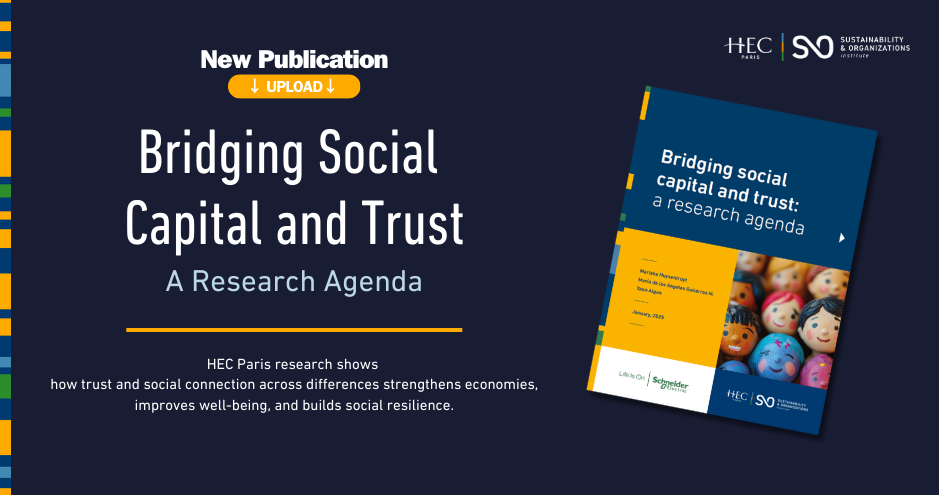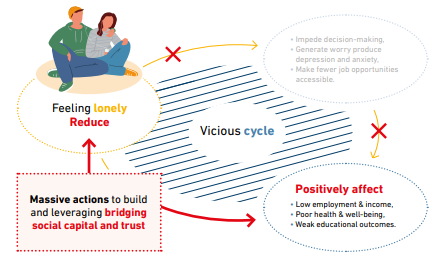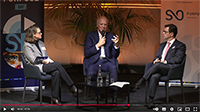Human Connection Is the Foundation of Resilient Societies
HEC Paris research shows how trust and social connection across differences strengthens economies, improves well-being, and builds social resilience.

The Silent Collapse Beneath Our Economies
Beneath the surface of our economies, a silent crisis is unfolding. It is the steady, invisible erosion of trust and social connections. New research report from Professors Marieke Huysentruyt (HEC Paris), María de los Ángeles Gutiérrez M. (London School of Economics), and Yann Algan (HEC Paris) reveals that bridging social capital — the ties that link people across diverse social groups — is not merely a cultural nicety. It is a critical driver of economic mobility, improved public health outcomes, and democratic stability.
The data are arresting: bridging social capital predicts upward mobility, stronger regional economies, healthier populations, and higher national incomes. In an age of surging loneliness, political polarization, and eroding trust in institutions, this invisible asset is depleting fast — and with it, the foundations of collective prosperity. If nations continue to undervalue and underinvest in their stock of social capital, the costs will be catastrophic.
“The future belongs to societies that invest in social bridges, not walls.”
Key findings
|
The High Costs of Loneliness and Social Fragmentation
HEC Paris researchers demonstrate that loneliness and social fragmentation are not only personal struggles; they are systemic risks. Chronic loneliness has been linked to mental illness, physical health decline, reduced employee performance, and even premature death. It imposes measurable costs on healthcare systems and labor markets.
Moreover, disconnection disproportionately affects marginalized groups—young people, low-income communities, minorities—amplifying social inequalities. These consequences feed into a vicious cycle: the more disconnected a society becomes, the harder it is to build trust in institutions, drive inclusive growth, or mobilize collective action around major challenges like climate change.
Trust is the Hidden Engine of Progress
The authors offer a striking reframing of how societies succeed or falter. Trust, they argue, is not a byproduct of prosperity — it is its precondition. It functions as a "lubricant" for economic and social exchanges, enabling cooperation where formal contracts cannot reach. In a high-trust society, businesses transact more efficiently, governments govern more effectively, and communities innovate more boldly.
Bridging social capital works alongside trust, serving as the connective tissue across divides of class, race, and ideology. When people from different backgrounds forge meaningful relationships, societies grow more resilient, more creative, and more just. The authors cite wide-ranging studies: children from low-income families thrive in neighborhoods rich in cross-class connections; regions with stronger social bridges experience faster economic growth; health outcomes improve markedly when individuals are less socially isolated.
And yet, trust and bridging ties are not immutable. Like wealth, they can be built — or depleted. They require deliberate cultivation, strategic investment, and conscious leadership.
The Proof that Deliberate Action Works
Some leaders and communities have already shown what is possible when social capital is deliberately nurtured. Across educational, organizational, and public settings, interventions that intentionally build bridging social ties are delivering real-world results.
In the United States, the Moving to Opportunity program, a federal housing initiative, relocated families from high-poverty neighborhoods to areas with greater socioeconomic diversity. The results were transformative: children who moved before adolescence experienced a 31% increase in annual income in adulthood, alongside significant improvements in physical and mental health. Importantly, the program not only improved individual life outcomes — it also revitalized trust in institutions and community engagement among relocated families.
Similar successes are evident elsewhere. In Medellín, Colombia, a once-violent city torn apart by inequality, policymakers invested in cable car systems that physically and symbolically connected marginalized neighborhoods to the urban core. The results were staggering: crime rates, including homicides, fell sharply, while economic opportunities and social cohesion expanded.
These examples are not anomalies. They demonstrate that when societies intentionally bridge social divides — through thoughtful urban planning, education reforms, or community programs — the ripple effects are profound: improved economic outcomes, greater public safety, enhanced civic trust, and stronger collective resilience. Bridging social capital can be rebuilt — but only through deliberate, sustained action.
From Research to Action: A New Social Agenda
The report outlines a four-part roadmap to rebuild trust and bridging social capital:
|
Redefining Progress: Why Human Connection Should Be a Core Metric
One of the boldest calls from this research is the need to refocus how we measure societal success. Traditional economic indicators like GDP or unemployment fail to capture the value of human connection, trust, and belonging. The HEC Paris team argues for a more holistic approach—one that includes social cohesion, inclusion, and collective resilience as central to national performance.
The implications are wide-ranging: businesses may begin to track trust as a core performance metric; public policies could prioritize social infrastructure; and educational institutions might equip students not just with technical skills, but with the capacity to build bridges across divides.
"The biggest challenge today is social cohesion, with the risk of societal fragmentation." Florent Ménégaux
Florent Ménégaux, CEO of Michelin at the HEC Purpose Day, 2025 |
In a time of uncertainty and fragmentation, this research reframes an ancient truth: our well-being depends not just on what we have, but on how well we are connected to one another.

